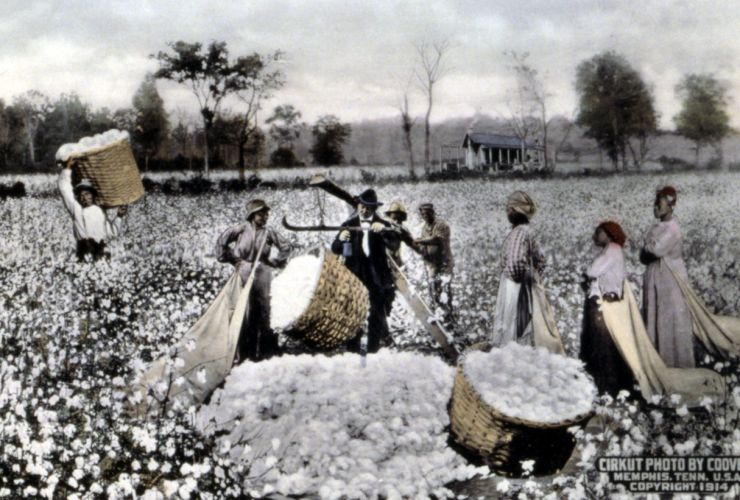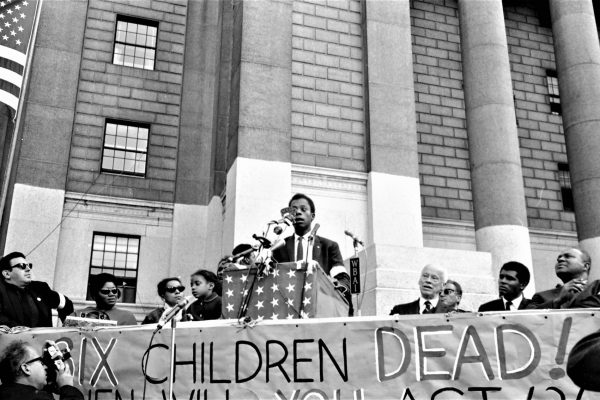Walter Johnson is upset at the state of the historiography of slavery and rightly challenges uncritical talk of “dehumanization.” In its most extreme iteration, a few have even likened enslavement to the domestication of animals. This logic would carry us all the way back to Aristotle, who described slaves as talking tools. Pro-slavery ideologues were fond of this idea, even though southern slaveholders exploited the “human capacities” of enslaved people—to labor, reproduce, and, in Johnson’s more Genovesean formulation, “to bear witness, to provide satisfaction, to provide a living, human register of slaveholders’ power.”
To advance this critique, Johnson appropriates Cedric Robinson’s thesis of racial capitalism. But he does not fully engage the antithesis of that social arrangement: what Robinson called the black radical tradition and W. E. B. Du Bois “the role black folk played” in reconstructing democracy. Radical black scholars and activists—from Robinson, Du Bois, and C. L. R. James to Claudia Jones, Ida B. Wells, Sterling Stuckey, and Vincent Harding—wrote histories not just of black oppression but also of resistance, a term that many historians of slavery and the African American experience now consider passé. Indeed, Johnson does not use the word at all. It might have an old-fashioned Marxist ring to it, but it has proven fruitful and capacious in the hands of such contemporary scholars of black politics and art as Eric Foner, Nell Painter, Steven Hahn, and Robin D. G. Kelley. These writers are heirs to a tradition that stretches back, in my reckoning, to African American abolitionists: Phillis Wheatley, Sojourner Truth, David Walker, Henry Highland Garnet, Frederick Douglass, Frances Harper, and Martin Delany. The richness of this lineage is missing from Johnson’s account even though, following Kelley, he acknowledges its contemporary activist formulation in the Movement for Black Lives’ broad-ranging manifesto, “A Vision for Black Lives.”
Writing in these pages last year, Peter Hudson took to task several recent books on slavery and capitalism for neglecting the black radical tradition. The problem with such “deracialized historiography,” Hudson argues, is that it views slaves mainly as objects of slaveholders’ power or as quintessential victims of the rise of capitalism, foreclosing “the recovery of black resistance.” Johnson clearly wrestles with this issue—whether or how to “recover” resistance—in the second half of his essay. On the one hand, the dehumanization argument carries with it the condescending notion that it is the historian’s task to assign “agency” and grant “humanity” to enslaved people, as if that were possible. Johnson argues that these attempts are symptomatic of “simple-minded notions of moral progress” that replace “histories of perpetration” with bourgeois notions of freedom and human rights, a discourse that he ascribes, with Samuel Moyn, to a neo-imperialist liberalism of the middle and late twentieth century. On the other hand, Johnson himself claims to speak from an “ethical dimension” in calling for a renewal of bottom-up history and a more robust Marxist notion of human emancipation.
This brings us back to Marx, and rightly so. But any appreciation of Marxism must begin with the recognition that, despite the attempts of scores of conservative writers and thinkers to write Marx out of the development of Western humanism, he was in fact a product—the logical endpoint, some might say—of Enlightenment thought. For Marx, capitalism was a revolutionary force that destroyed centuries of tradition—archaic economic structures such as feudalism and slavery—in a teleological historical schema. Even the tyranny of European imperialism, he argued, destroyed still more tyrannical systems, which he termed “Asiatic despotism.” Marx understood the human cost of slavery, capitalism, and imperialism better than any other Western radical thinker of his time, but he wrote from the vantage point of a nineteenth-century European. It has taken generations of other thinkers and revolutionaries—including V. I. Lenin, Rosa Luxemburg, and M. N. Roy—to extend Marx’s insights about the history of imperialism, just as it has taken generations of black scholars and activists—including Robinson, Du Bois, and James—to do the same for the history of slavery and race.
Capitalism, in this deepened understanding, was hardly a force of progressive destruction, ushering in the dawn of communism. It not only reinforced old structures of oppression but also created its own barbaric forms of exploitation. Nor has it always promoted the growth of democracy; in most cases it has led to the evisceration of democratic norms and principles. (Marx himself made this point in his brilliant The Eighteenth Brumaire of Louis Napoleon, a history of the fall of the French Second Republic.) The bourgeoisie is neither democratic nor progressive, contrary its depictions in the long-enthroned, antiseptic, and whitewashed narratives of Anglo-American history. Like all ruling classes in history, it tends to be reactionary and anti-democratic, happy to consort with aristocrats, slaveholders, and fascists when the opportunity arises. It is stingy when it comes to democracy, citizenship, and rights, drawing rigid lines of nationality, race, class, and gender. In short, the advance of democracy in the world, Western or otherwise, has very little to do with elites and a lot to do with the demands of the subaltern, however we may define them.
To dismiss the idea of universal human rights as bourgeois folly is thus an academic exercise, a lily-white conceit unmindful of the history of the black liberation struggles and anti-imperialist movements that were much more important to its emergence in the mainstream than some self-actualizing trajectory of liberalism in the West. The lion’s share of the credit belongs not to liberals but to the black radical tradition and the critique of Western imperialism emerging from the Global South, Africa, Asia, and Latin America. This is the reason black radicals—such as Du Bois and others who took part in the Pan-African Congress—saw anti-racism in the United States and anti-imperialism as two sides of the same coin. And, yes, these movements do connect to the Western tradition epitomized by Thomas Paine, Marx, and interracial abolitionism. Long before the United Nation’s Universal Declaration of Human Rights (1948), abolitionists had made human rights a touchstone for resisting the racialist laws of the slaveholding republic. That is why black activists from Du Bois and Paul Robeson to Malcolm X and Black Lives Matter have sought to bring their country to the bar of international public opinion and the UN on charges of violating human rights.
The erasure of this history is both pervasive and insidious. Some radical scholars in the West have perhaps been just as guilty of Eurocentrism as their liberal counterparts in dismissing “third world nationalism” and movements against racial injustice as essentialist, alien and foreign to some pristine nationalistic left traditions of their own. In the United States this thinking masquerades as a critique of “identity politics,” unmindful of the interconnectedness—or to use a more fashionable term, intersectionality—of racial, gendered, and economic injustice and struggles. The truth is that unless we develop a politics of resistance that marries the internationalism of early Marxism with the very particular history of racial liberation struggles all over the world—something that black radical activists and “third world” revolutionaries have actually attempted to do—we are doomed.
It is high time, then—as we theorize and return to the insights of racial capitalism—that we situate our discussion of emancipation in the very specific black radical tradition that Robinson and Du Bois evoked. When we write new histories of slavery and capitalism, we need to revive both the history and the ongoing political project of black liberation. If histories of capitalism have been willfully blind to slavery, race, and imperialism, they are “equally blind to the emancipatory possibilities of the black radical tradition which emerged in opposition to it,” as Paul Hebert put it in a recent forum on Robinson’s Black Marxism on the African American Intellectual History Society’s blog. This tradition has a lot to tell us about the theory and praxis of resistance. (That does not mean it should be immune to critique. In the same forum, Carol Boyce Davies notes the erasure of African American women, and issues of gender and sexuality more generally, from a masculinist construction of resistance.)
In writing these new histories, we must be sensitive to our own historical exigencies. As Robinson noted, “The resoluteness of the black radical tradition advances as each generation assembles the data of its experience to an ideology of liberation.” There is a telling illustration of this advancement in the disagreement between C. L. R. James and Eric Williams. Though he sharply analyzed the central role of slavery in the emergence of capitalism, Williams viewed abolition as a bourgeois, metropolitan business decision to shift resources from an allegedly bankrupt slave system to industrial capitalism. James, by contrast, restored the Haitian Revolution to the history of global abolition in his seminal work The Black Jacobins, and Du Bois made the slaves’ general strike central to the story of Civil War emancipation—two important steps in recovering the significance of the black radical tradition in the history of abolition and emancipation. It is notable, as Matthew Quest has detailed in Insurgent Notes, that James criticized Williams’s book for leaving out “the liberating activity of the slaves themselves.” Only by writing people of African descent out of the history of abolition can we view it as a white, bourgeois movement designed to justify capitalism and, later, imperialism. Only by writing the non-white world out of the history of democracy and human rights can we develop narrow and ahistorical genealogies of their emergence and progress in the modern Western world, which since its conception has been interracial.
Robinson puts it best in Black Marxism: the enslaved “constituted one of the crucial social bases in contradiction to bourgeois society.” Radical social movements, including abolitionism, “generate new knowledge, new theories, new questions,” Robin Kelley further notes in Freedom Dreams: “The most radical ideas often grow out of a concrete intellectual engagement with the problems of aggrieved populations confronting systems of oppression.” Johnson’s concluding prescriptions have long historical antecedents, too easily forgotten and frequently misunderstood.
This forum is featured in Race Capitalism Justice, now available in reprint. Order your copy today.








